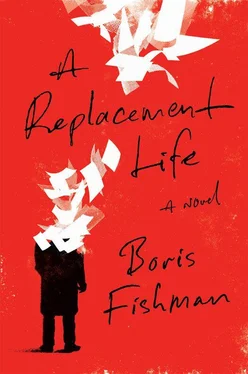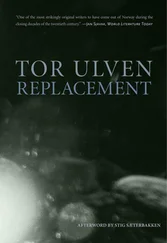“No, no,” she said. “This way, my mind is busy. Working at the pharmacy, you get the impression that there are no healthy people in the world. The normal condition is not health but illness. It makes you feel better in a way — I used to ask God why only she became ill — but then you feel guilty about it. And I still ask God, only a different question: If so many are ill, why did she have to die? And I feel terrible, like a hideous person. But I miss my mother.”
“As I miss her,” he said.
“You can’t sleep,” she said.
“I can’t sleep,” he confirmed. “Would she have gone along? With what I’m doing?”
“She loved you so much,” she said.
“But what I’m asking.”
“She loved all of us. There was nothing you could do that she wouldn’t go along with.”
“This is just a nice thought. When she found me with Lusty Lena, she got me by the ears, I can still feel it.”
“I don’t know what you want me to say, son — we were having a nice conversation.”
He apologized and gave in to silence. “It’s getting light,” he said at last. “Is it getting light by you?”
“Yes,” she said. “You know the heat makes me crazy, but I think about fall, and I start crying. It’s a crime for a person to die in the spring because everything is just beginning, and it’s a crime for a person to die in the fall because everything is ending as it is, and a person can’t die in the summer because it’s the summer. A person should die in the winter. Only in the winter. I hope I die in the winter.”
“Then the ground is icy and you probably have to pay the diggers more,” he said, and they laughed at this joke about their frugality, the frugality of all immigrants.
“You have to go,” he said. “You’ll be late.”
“So I’ll be late,” she said.
“We’re performing a service, aren’t we?” he said. “You keep them in prescriptions — you keep them alive — and I keep them in funds.”
“It feels good to be on the same side as you,” she said. “I am envious, however. They get to see you every day. You’ve skipped over us. I mean your father and me.”
“You’re too young to qualify,” he tried to joke.
She laughed politely. “No, it’s true, the grandparents are the ones with the stories. We always thought telling you less was the right way. Maybe your children will come to us.”
“Say hello to her when you go to the cemetery,” he said.
“You’ve remembered your Russian so quickly,” she said. “No, you speak better than you used to. Shouldn’t you visit her, too?”
“I visit her in my own way,” he said.
Even though they, each for his own reason, did not wish to end the conversation, they had come to the end of what they could say in peace, and said goodbye.
He returned to the bed, sliding in gently so as not to rouse the cat despite their earlier disagreement. He listened obediently to Arianna’s unlabored breathing, intending to be in someone’s, something’s, good graces. She slept heedlessly, her lips slightly ajar, her face an oval cameo. He discovered an intimate paradox: He had looked at her every day for more than a month but had not registered the color of her eyes. Now that her eyes were closed, however, he was without doubt that they were gray, a shining gray, though they seemed darker because of their thick lashes, which was why if someone had asked Slava what color they were, he would have said black, almost black.
Before they began to see each other regularly, her eyes were filled with a smirking amusement, which irritated him — she was making fun of him, his nose buried in work. Belatedly, he understood that smirk to have been an expression of self-protection, because soon it gave way to tender excitement, even admiration. And periodically to worry, to a futile intent on restraint — the two of them were moving so quickly. It was different now. When Arianna’s freckled lids, the left with its divided birthmark, opened from sleep, they would gaze upon Slava with doubt and dread. He wanted her to keep sleeping, as in a fairy tale. Among these thoughts, finally he fell asleep.
The soiree in honor of Century magazine was taking place in the home of the first girl Slava Gelman had kissed in America. Elizabeth Lechter had just had her braces removed, and her teeth shone in a perfect white row you could make out from across the room. However, Elizabeth was nowhere to be seen — it was as if Century had agreed to have the party at the Lechters’, all the way in suburban New Jersey, only if the Lechters made themselves scarce. This was a relief to Slava because his eyes were on Arianna, floating around the room in a red sheath dress, sleeved to her forearms, that ended midway down her thighs, and he didn’t want to make Elizabeth feel bad.
Beau, for some reason, wore a cape, mauve with white polka dots. Avi Liss nursed a gin and tonic by himself. Peter Devicki was chasing Charlie Headey’s girlfriend around the Lechters’ white leather couch, Headey’s girlfriend squealing and their drinks spilling on the leather, to Slava’s guilt and dismay. Beau ordered Peter to stop, and Peter wandered over to confer with his boss. Charlie Headey tried to confer with his girlfriend, but she waved him away; there was a kiddie pool in the middle of the Lechters’ living room, and that was where she decided to rest. Arianna regarded her with a head-shaking smile from across the room.
A poster board was mounted above the Lechters’ fireplace. It displayed the winning article in Beau Reasons’s recent competition for a story about the adventures of an urban explorer. Above the article, in the unmistakable Century font, the byline said: Peter Devicki. Slava strained to make out the story from his perch across the room but couldn’t.
After he finished conferring with Beau, Peter disappeared from the room. When he reentered, he held a black Sharpie in his hands. “That’s a big kitchen,” he said. “To the Lechters!” Beau shouted. “To the Lechters!” Mr. Grayson seconded. “To the Lechters!” Charlie Headey’s girlfriend shrieked. The rest of the room joined in.
While the staff of Century celebrated the Lechter family of Ridgewood, New Jersey, Peter Devicki went up to the poster board displaying Slava’s article, uncapped the Sharpie, and drew a fat line across the byline. Above it, he wrote: Slava Gelman. Again, the room erupted in cheers. “To Peter Devicki!” people shouted. “To the Lechters!” “To the Lechters and Peter Devicki!” Even Avi Liss had risen from his seat, thrusting his glass outward, the Lechters’ white couch by now covered with the colors of a half-dozen drinks.
Slava sat motionlessly. He couldn’t rise, though he needed to. He watched Arianna, who was not toasting with the rest of the group, walk up to the poster board and study it like a painting. Then, she turned around and walked toward Peter, who stood by a wall covered with brick faceplates to resemble a wall of exposed brick in the city. She wrapped her hand around his forearm, lowered her eyes, and began whispering into his neck.
A terrible feeling entered Slava’s chest. He had to intervene but couldn’t move. Was he there? He was there. One person noticed him. His grandfather noticed him. He stood in a corner across the room, like a schoolboy who had been disciplined. Slava felt a needle of irritation — the old man would say something to embarrass him.
His grandfather was wet, head to toe. He wore clothes, his usual clothes, corduroy pants and a wool sweater even though it was summer, but he was soaked and shivering, his teeth chattering, gold knocking on gold. Inside the corduroys, it was as if there were no flesh covering the bone of the knees — the left kneecap rattled against the right. The hands that emerged from the sweater, however, were fully fleshed. One over the other, they covered his balls as he cried out from fright.
Читать дальше











